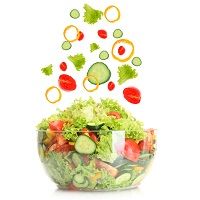Article
Vegetarian Diet Lowers Risk of Colorectal Cancers, Study Finds
Author(s):
Eating a vegetarian diet has been linked to a lower risk of colorectal cancers.

Eating a vegetarian diet has been linked to a lower risk of colorectal cancers.
While great attention had long been paid to screening, the key objective had been considered primary prevention through lowering risk factors.
A study of Seventh-day Adventist men and women, published online by JAMA Internal Medicine, had identified a few dietary factors as a modifiable risk factor for colorectal cancer: red meat, which is linked to increased risk and food with high dietary fiber, which is associated with reduced risk.
Initially, 96,354 Seventh-day Adventist men and women were recruited between Jan. 1, 2002, and Dec. 31, 2007.
Michael J. Orlich, MD, PhD, of Loma Linda University, California, and coauthors observed a total of 77,659 study participants from the original pool of individuals and identified 380 cases of colon cancer and 110 cases of rectal cancer.
Orlich and his team assessed diet at baseline through a quantitative food frequency questionnaire and categorized their subjects into 4 vegetarian dietary patterns — vegan, lacto-ovo vegetarian, pesco-vegetarian, and semi-vegetarian, along with the non-vegetarian dietary pattern.
They noted that compared with non-vegetarians, vegetarians experienced a 22% lower risk for all colorectal cancers, 19% lower risk for colon cancer, and 29% lower risk for rectal cancer.
However, study results indicated that compared with non-vegetarians, vegans had a 16% lower risk of colorectal cancer, lacto-ovo vegetarians had an 18% less risk, pesco-vegetarians reported 43% less risk, and semi-vegetarians saw 8% less risk.
"If such associations are causal, they may be important for primary prevention of colorectal cancers. The evidence that vegetarian diets similar to those of our study participants may be associated with a reduced risk of colorectal cancer, along with prior evidence of the potential reduced risk of obesity, hypertension, diabetes and mortality, should be considered carefully in making dietary choices and in giving dietary guidance,” concluded the authors.





